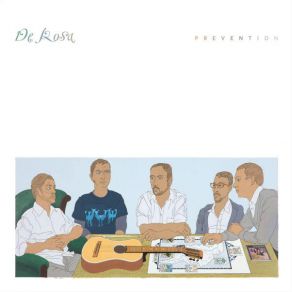Prevention
Download links and information about Prevention by De Rosa. This album was released in 2009 and it belongs to Indie Rock, Alternative genres. It contains 10 tracks with total duration of 44:53 minutes.

|
|
|---|---|
| Artist: | De Rosa |
| Release date: | 2009 |
| Genre: | Indie Rock, Alternative |
| Tracks: | 10 |
| Duration: | 44:53 |
| Buy it NOW at: | |
| Buy on iTunes $9.90 | |
| Buy on iTunes $6.99 | |
| Buy on Songswave €1.52 | |
Tracks
[Edit]| No. | Title | Length |
|---|---|---|
| 1. | A Love Economy | 4:59 |
| 2. | Nocturne for an Absentee | 4:43 |
| 3. | It Helps to See You Hurt | 4:26 |
| 4. | Pest | 5:08 |
| 5. | Stillness | 4:15 |
| 6. | Under the Stairs | 3:45 |
| 7. | In Code | 4:30 |
| 8. | Swell | 4:07 |
| 9. | Flight Recorder | 4:39 |
| 10. | Tinto | 4:21 |
Details
[Edit]It's perhaps appropriate that an album released in early 2009 start with a song called "A Love Economy," if only because that might have been one of the few around the world at that time showing a reasonable rate of return. De Rosa's Prevention, the Scottish band's second full release, steers an often enjoyable course between the kind of sweeping theatricality that defines much of 21st century indie rock and a close directness that brings that feeling back down to earth. It can be heard on "Nocturne for an Absentee" — if some of the rumbling undercarriage and guitar almost sounds like it's going to break into a rehearsal tape for a U2 support act in the late '80s, it then shifts to a smooth, calmer vocal delivery that softly rides the music instead of trying to proclaim over it, matched by calm chimes along the way. The rough melancholia of "Under the Stairs," the album's powerful centerpiece, stands out as the best incarnation of this overall approach. Sometimes the feeling is the slightly disconcerting one of the stadium-ready power ballad — "Pest" somehow seems all too perfect for a crowd, lighters at the ready, while the overt Thom Yorke worship in the vocals on "Swell" begs the comparison from the start — and overall Prevention does not bring much completely new to a table where bands like Coldplay and the Arcade Fire have long since established their particular styles. Still, De Rosa's variation has its attractive-sounding place.